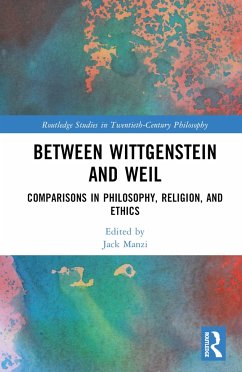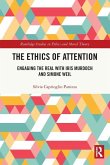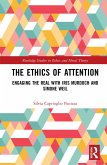This volume explores the relationship between the philosophical thought of Simone Weil and Ludwig Wittgenstein. The contributions shed light on how reading Weil can inform our understanding of Wittgenstein, and vice versa.
The chapters cover different aspects of Weil's and Wittgenstein's philosophy, including their religious thought and their views on ethics and metaphilosophy. They address the following questions: How does Wittgenstein's struggle with religious belief match up with Simone Weil's own struggle with organised belief? What is the role of the mystical and supernatural in their works? How much impact has various posthumous editorial decisions had on the shaping of Weil's and Wittgenstein's thought? Is there any significance to similarities in Weil's and Wittgenstein's written and philosophical styles? How do Weil and Wittgenstein conceive of the 'self' and its role in philosophical thinking? What role does belief play in Weil's and Wittgenstein's respectivephilosophical works?
Between Wittgenstein and Weil will be of interest to scholars and advanced students working in twentieth-century philosophy, philosophy of religion, philosophy of language, and the history of moral philosophy.
The chapters cover different aspects of Weil's and Wittgenstein's philosophy, including their religious thought and their views on ethics and metaphilosophy. They address the following questions: How does Wittgenstein's struggle with religious belief match up with Simone Weil's own struggle with organised belief? What is the role of the mystical and supernatural in their works? How much impact has various posthumous editorial decisions had on the shaping of Weil's and Wittgenstein's thought? Is there any significance to similarities in Weil's and Wittgenstein's written and philosophical styles? How do Weil and Wittgenstein conceive of the 'self' and its role in philosophical thinking? What role does belief play in Weil's and Wittgenstein's respectivephilosophical works?
Between Wittgenstein and Weil will be of interest to scholars and advanced students working in twentieth-century philosophy, philosophy of religion, philosophy of language, and the history of moral philosophy.
"This volume correlates two figures of the early twentieth-century renowned for their rigour, genius, precocity, and the purity of their quests - betraying a certain saintliness. Intellectual fascination with Weil and Wittgenstein never seems to flag for a reason. In an era with few spiritual beacons, both manifested in their lives and thought the essence of religious authenticity. Bringing the two together helps each to stand forth in uncompromising individuality all the more sharply."
Lissa McCullough, California State University Dominguez Hills, USA
Lissa McCullough, California State University Dominguez Hills, USA









